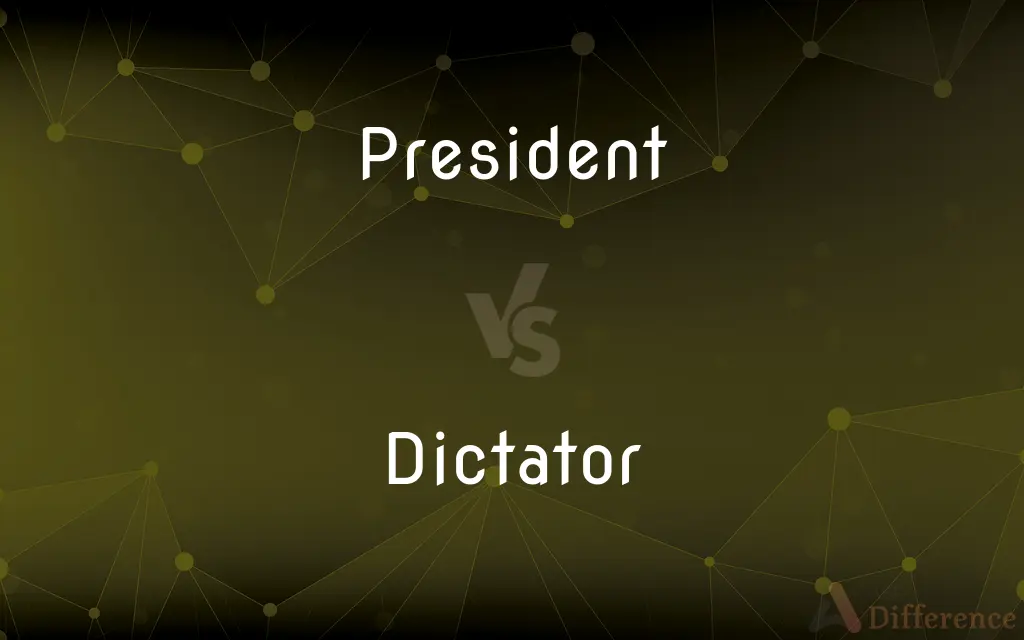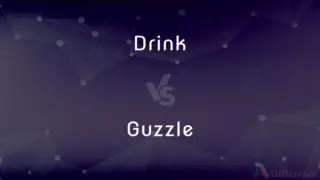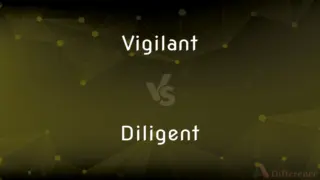President vs. Dictator — What's the Difference?
By Tayyaba Rehman — Updated on November 4, 2023
A president is a democratically elected head of state, while a dictator is an authoritarian ruler with absolute power.

Difference Between President and Dictator
Table of Contents
ADVERTISEMENT
Key Differences
A president is generally the elected head of a republican state or organization, serving as the leader within the constraints of a constitution or legal framework. In contrast, a dictator often assumes power through force or manipulation and may not be bound by a constitution or laws. The term president usually implies a democratic process and limited term of office, while dictator implies autocratic rule and often an indefinite term.
Presidents are often seen as symbols of their nation or organization, representing the collective values and governance agreed upon by the populace or members. Dictators, however, often become symbols of their own rule, representing an individual will imposed upon the people. Where a president's role includes upholding the rights of others, a dictator may infringe upon those rights to maintain control.
The power of a president is typically balanced by other branches of government, such as the legislative and judicial branches, which are designed to prevent autocracy. A dictator's power, however, is often unchecked by any other institution, allowing for unilateral decision-making. This concentration of power in the hands of a dictator can lead to a lack of transparency and accountability.
In many cases, presidents are held accountable to the electorate and can be removed from office through elections or impeachment processes. Dictators, on the other hand, are not usually accountable to the public and may only be removed through extraordinary means, such as coups, uprisings, or foreign intervention. The distinction lies not just in how they come to power, but in how they are able to maintain it.
Comparison Chart
Method of Acquisition of Power
Democratically elected
Seizes power or inherits
ADVERTISEMENT
Term of Office
Fixed by constitution or law
Indefinite or until overthrown
Checks and Balances
Subject to checks by other branches
Few or no checks on power
Accountability
Accountable to the public and law
Often unaccountable to the public
Governance Style
Democratic and representative
Autocratic and authoritarian
Compare with Definitions
President
Commander
The president visited the troops abroad last month.
Dictator
Absolute
The dictator made all legislative decisions unilaterally.
President
Political
The president campaigned on a platform of healthcare reform.
Dictator
Power
The dictator amassed wealth at the expense of the state.
President
Executive
The president executed the new environmental policy.
Dictator
Control
The dictator suppressed dissent through force.
President
Ceremonial
The president attended the summit as a representative of the nation.
Dictator
Regime
The dictator's regime was marked by human rights abuses.
President
One appointed or elected to preside over an organized body of people, such as an assembly or meeting.
Dictator
A dictator is a political leader who possesses absolute power. A dictatorship is a state ruled by one dictator or by a small clique.
President
The chief executive of a republic.
Dictator
An absolute ruler.
President
The chief executive officer of the United States, with powers as determined by the US Constitution.
Dictator
A tyrant; a despot.
President
The chief officer of a branch of government, corporation, board of trustees, university, or similar body.
Dictator
An ancient Roman magistrate appointed temporarily to deal with an immediate crisis or emergency.
President
The head of state of a republic.
The vast majority of presidents have been male.
Dictator
One who dictates
These initials are those of the dictator of the letter.
President
In presidential republics, the head of government and head of state.
Dictator
A totalitarian leader of a country, nation, or government.
President
Primary leader of a corporation. Not to be confused with CEO, which is a related but separate position that is sometimes held by a different person.
Dictator
(history) A magistrate without colleague in republican Ancient Rome, who held full executive authority for a term granted by the senate (legislature), typically to conduct a war.
President
A person presiding over a meeting; a chair, presiding officer, presider.
Dictator
A tyrannical boss or authority figure.
President
Obsolete form of precedent
Dictator
A person who dictates text (e.g. letters to a clerk).
President
(archaic) Occupying the first rank or chief place; having the highest authority; presiding.
Dictator
One who dictates; one who prescribes rules and maxims authoritatively for the direction of others.
President
To act as president; to do presidential duties.
Dictator
One invested with absolute authority; especially, a magistrate created in times of exigence and distress, and invested with unlimited power.
Invested with the authority of a dictator, nay, of a pope, over our language.
President
Precedent.
Dictator
A speaker who dictates to a secretary or a recording machine
President
One who is elected or appointed to preside; a presiding officer, as of a legislative body.
Dictator
A ruler who is unconstrained by law
President
A protector; a guardian; a presiding genius.
Just Apollo, president of verse.
Dictator
A person behaves in an tyrannical manner;
My boss is a dictator who makes everyone work overtime
President
Occupying the first rank or chief place; having the highest authority; presiding.
His angels presidentIn every province.
Dictator
Autocrat
The dictator ruled without the consent of the governed.
President
An executive officer of a firm or corporation
President
The person who holds the office of head of state of the United States government;
The President likes to jog every morning
President
The chief executive of a republic
President
The officer who presides at the meetings of an organization;
Address your remarks to the chairperson
President
The head administrative officer of a college or university
President
The office of the United States head of state;
A President is elected every four years
President
Leader
The president is the elected head of a democratic state.
Common Curiosities
How is a president elected?
Through a democratic electoral process.
Is a president always the head of state?
In many countries, yes, but some have a separate head of government.
Can a president have unlimited terms?
Most democratic constitutions limit presidential terms.
Does a dictator have a legal term limit?
Typically, no. Their rule is often indefinite.
Are dictators accountable to a constitution?
They often operate outside of the constraints of a constitution.
How does a dictator gain power?
Often through force, inheritance, or undemocratic means.
What defines a president?
A president is usually the elected head of a democratic state.
What happens when a president's term ends?
They leave office, and a new president is elected.
Can a president be impeached?
Yes, if they violate laws or constitutional provisions.
What defines a dictator?
A dictator is an authoritarian ruler with absolute control.
Do presidents have complete control over the government?
No, their powers are usually limited and balanced by other branches.
Do dictators hold fair and free elections?
No, elections under a dictatorship, if held, are often rigged.
Can a dictator be removed peacefully?
It's rare, as they usually hold power through control of the military or police.
What is a common way a dictator's rule ends?
Through force, such as a coup, revolution, or foreign intervention.
Can a president become a dictator?
If they seize absolute power and dismantle democratic institutions, theoretically, yes.
Share Your Discovery

Previous Comparison
Drink vs. Guzzle
Next Comparison
Vigilant vs. DiligentAuthor Spotlight
Written by
Tayyaba RehmanTayyaba Rehman is a distinguished writer, currently serving as a primary contributor to askdifference.com. As a researcher in semantics and etymology, Tayyaba's passion for the complexity of languages and their distinctions has found a perfect home on the platform. Tayyaba delves into the intricacies of language, distinguishing between commonly confused words and phrases, thereby providing clarity for readers worldwide.














































